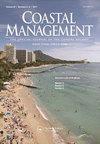维持阿拉斯加沿海社区:整合基于地点的福祉指标和渔业参与
IF 1.9
4区 环境科学与生态学
Q4 ENVIRONMENTAL SCIENCES
引用次数: 11
摘要
摘要将人的维度纳入基于生态系统的渔业管理,主要集中在经济福利指标上。然而,研究人员已经证明了渔业带来的各种福祉,以及本地化和合作的科学努力的必要性,这些努力可以产生适当的情境化指标。本文介绍了一个旨在满足这些需求的项目的结果,并为北太平洋渔业管理进程提供了一套指标,这些指标涉及人类福祉的多个层面以及与渔业参与的联系。这篇文章展示了一种应用福祉框架和参与性方法为阿拉斯加最活跃的渔业社区之一锡特卡制定当地相关定量指标的机制。这些指标可用于跟踪渔业冲击如何在社会系统中产生反响并影响渔业社区。此外,对多方面福祉指标的讨论提供了关于当地价值观和社区福祉与渔业之间复杂动态的信息,这些信息很难概念化并纳入管理决策。最终,这项工作可以促进将人的层面更全面地纳入渔业管理中基于生态系统的框架,并将这种扩展纳入当地相关的叙述中,让利益攸关方参与资源管理。本文章由计算机程序翻译,如有差异,请以英文原文为准。
Sustaining an Alaska Coastal Community: Integrating Place Based Well-Being Indicators and Fisheries Participation
Abstract The incorporation of human dimensions into ecosystem-based fisheries management has largely focused on metrics of economic welfare. Yet researchers have demonstrated the variety of well-being that is derived from fisheries as well as the need for localized and collaborative scientific efforts that result in appropriately contextualized metrics. This article presents the results of a project intended to address these needs and inform the North Pacific fisheries management process with a set of indicators that are related to multiple dimensions of human well-being and links to fisheries participation. The article showcases a mechanism of applying a well-being framework and participatory methods to develop locally relevant quantitative indicators for one of the most highly engaged fishing communities in Alaska - Sitka. These indicators can be used to track how fishery shocks may reverberate through social systems and affect fishing communities. Furthermore, the discussion of the multifaceted well-being indicators presents information on local values and complex dynamics between community well-being and fisheries that are difficult to conceptualize and integrate into management decisions. Ultimately, this work can facilitate a more comprehensive incorporation of human dimensions into ecosystem-based frameworks in fisheries management, contextualizing that expansion within locally relevant narratives that engage stakeholders in resource management.
求助全文
通过发布文献求助,成功后即可免费获取论文全文。
去求助
来源期刊

Coastal Management
环境科学-环境科学
CiteScore
6.00
自引率
0.00%
发文量
24
审稿时长
>36 weeks
期刊介绍:
Coastal Management is an international peer-reviewed, applied research journal dedicated to exploring the technical, applied ecological, legal, political, social, and policy issues relating to the use of coastal and ocean resources and environments on a global scale. The journal presents timely information on management tools and techniques as well as recent findings from research and analysis that bear directly on management and policy. Findings must be grounded in the current peer reviewed literature and relevant studies. Articles must contain a clear and relevant management component. Preference is given to studies of interest to an international readership, but case studies are accepted if conclusions are derived from acceptable evaluative methods, reference to comparable cases, and related to peer reviewed studies.
 求助内容:
求助内容: 应助结果提醒方式:
应助结果提醒方式:


